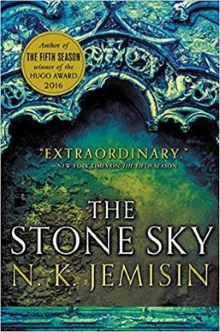
It occurs to me with this book that I haven’t properly finished reading a traditional trilogy of novels in a long while. I still think it’s ridiculous that every book in the trilogy won the Hugo and I don’t agree that it stands on the same level as the true greats of fantasy and science-fiction. But I would happily agree that this is a rollicking good read and this last book does bring the series to a more or less satisfying conclusion.
Again, picking up immediately after the events of the previous book, this novel follows three main characters. Two are obvious. After destroying the invading army, Essun and the other survivors of Castrima make the arduous journey to the now empty city of Rennanis where the invaders came from. Meanwhile Nassun has just killed her father. Her Guardian Schaffa resists the influence of the Earth and helps her escape. Both Essun and Nassun realize that they must make their way to Corepoint at the other side of the world in order to do something about the approaching Moon. The most interesting perspective however is a flashback that takes place before the Shattering when civilization was at the height of technology that makes use of both bioengineering and magic. The point of view character is left unsaid for a long while but it’s obvious to anyone who is paying attention that it tells the story from the point of view of the Stone Eater Hoa.
This last book naturally answers most, though not all, of our questions. I still don’t quite understand how the Sanzed Empire incorporated the Guardians into their power structure given that they really answer to the Earth itself. The history goes much further back than I expected as it involves the fate of a long extinct people but there are no big surprises here. Most of the enjoyment of this book actually lies in the wonders that the long gone civilization was capable of, both as Hoa lived it and as Nassun sees when she travels to Corepoint. The idea of a long distance train system that goes through the planet’s core is awesome no matter how you look at it. The book spends some time as well recounting Essun’s journey to Rennanis and Nassun’s journey to the Antarctic station where she takes the train. Unfortunately those feel like retreads of the previous books and mere distractions from the long awaited reunion between Essun and Nassun. I do like that Essun has some character development on her journey as she comes to realize that she ought to feel some sense of belonging to a wider community. Nassun’s development here is less interesting: basically lots of rage and resentment.
A sense of inevitability persists throughout the novel. The anticipation builds up so strongly that delivering the final payoff was always going to be tough and indeed Essun and Nassun’s meeting comes and goes in a flash. It’s frustrating that with the Moon bearing down on them and Nassun in a hurry to save Schaffa’s life, they don’t get to sit down and really talk. Essun doesn’t even get to interact with Schaffa at all. Then again, Essun pretty much instantly realizes what Nassun has gone through so not too many words are needed. But I still feel that the final resolution takes place too quickly. Even the other stone eaters who oppose Hoa are talked down without much fuss. It’s especially unsatisfying that Essun brings the whole group to Corepoint and they don’t really get to do anything. The whole thing makes sense as a story of the world but the stories of the individual characters here feel incomplete.
Judged as whole the trilogy is pretty good and as I’ve said before, I love how it has stronger literary aspirations than usual genre books. There are so many themes packed into it, how Essun’s love for Nassun drives the daughter to hate her, slavery and genocide, racism and oppression etc. But I still don’t agree that it’s truly great. This last novel is probably the weakest of the bunch, coasting as it does on momentum generated in the previous books and with the best parts of it being Hoa’s backstory.